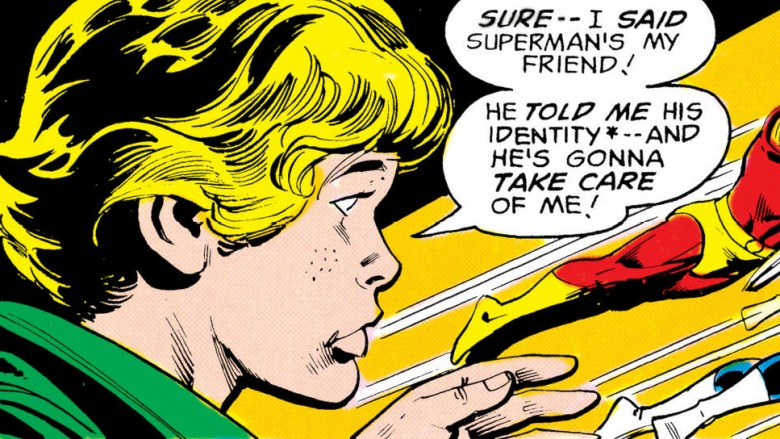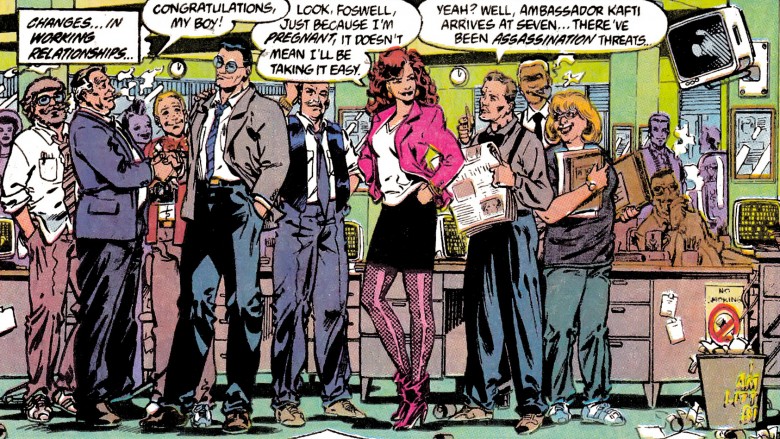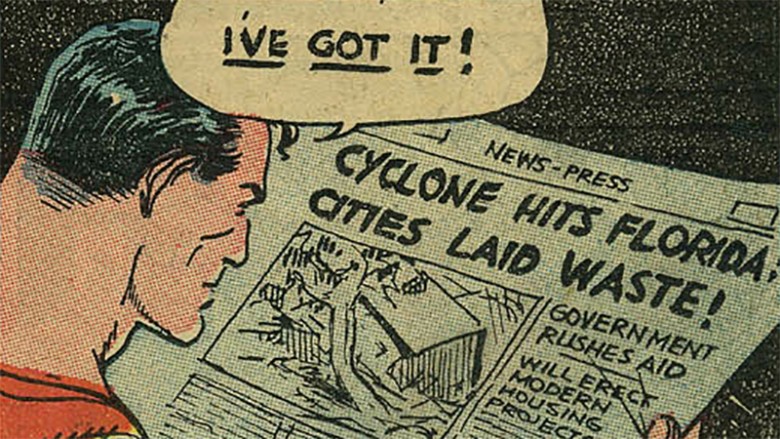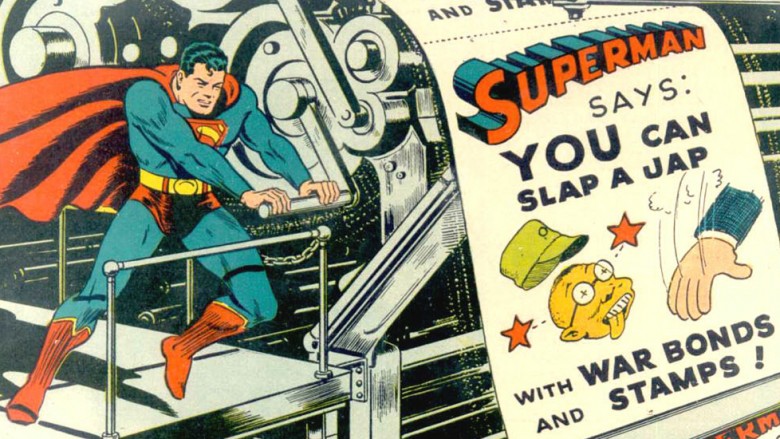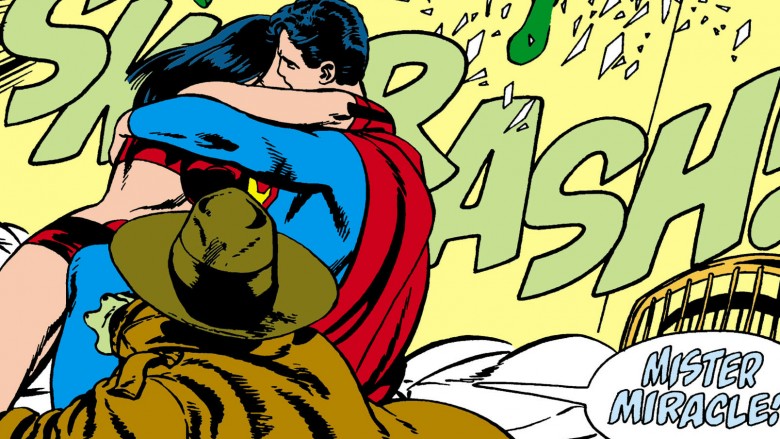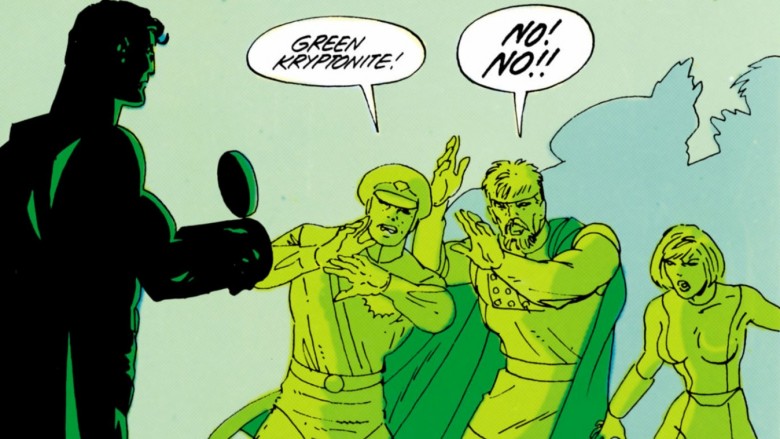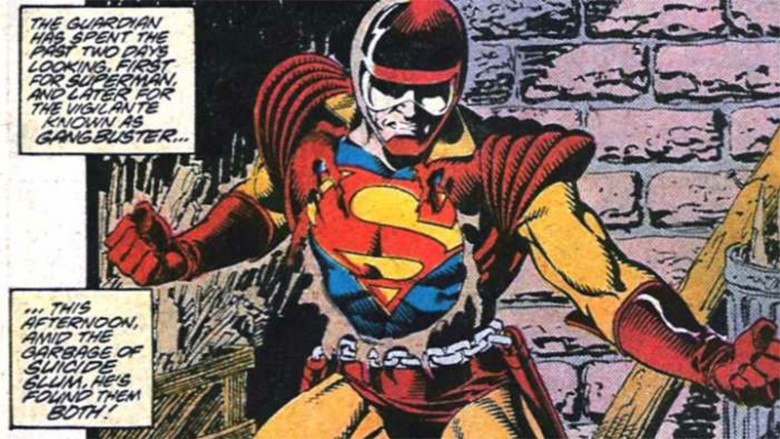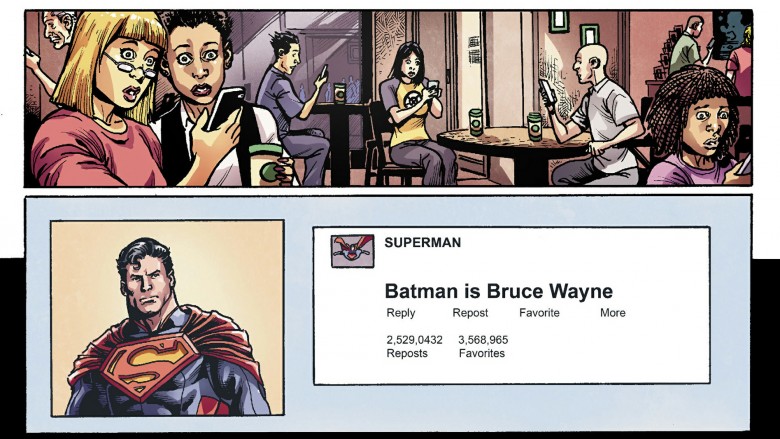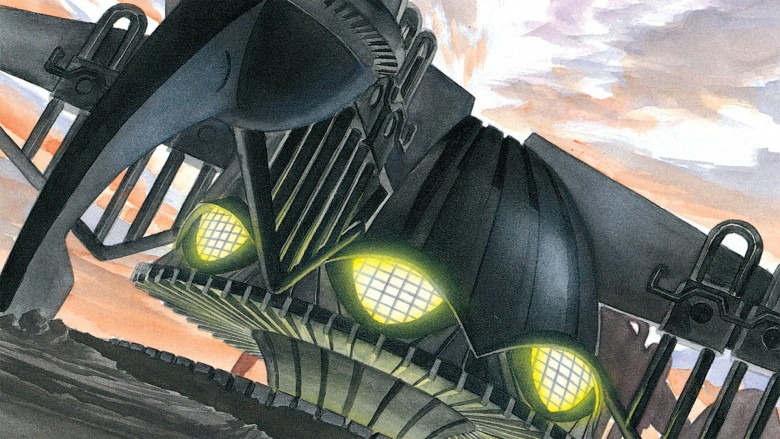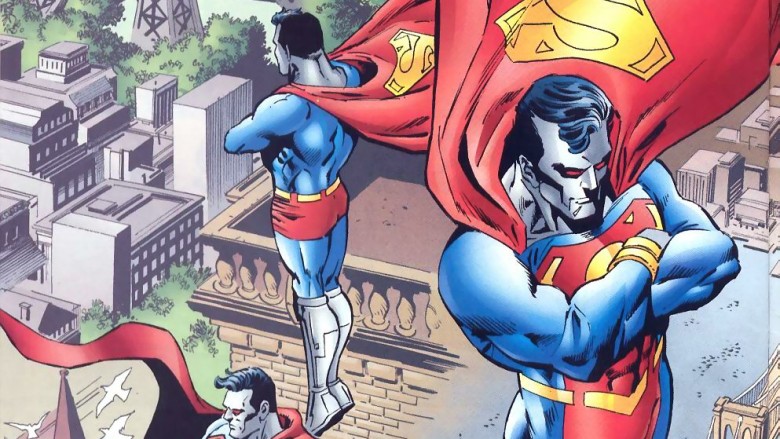The Most Terrible Things Superman Has Ever Done
For all of the good that Superman's done—and, over the past 80 years, he's done a lot of good—he can be kind of obnoxious. He constantly lies to Lois Lane. He torments his pal Jimmy Olsen for fun. He lectures people about right and wrong at the drop of a hat, and he fights his closest ally, Batman, all the time. Heck, Superman is such a jerk that there's even an entire website dedicated to documenting his "superdickery."
But there's a difference between sanctimonious passive-aggression and out-right supervillainy, and while Superman rarely crosses it, he often toes the line. Sometimes, Superman thinks he's acting in humanity's best interest, and just makes a bad judgement call. Other times, he's pushed to extremes by villains and doesn't have a good way out. Occasionally, it's mind-control or an alternate dimension. And every now and then, as rare as it is, the Man of Steel just gets downright nasty.
Cut the guy a break. After all, nobody's perfect—not even Superman.
He abandoned his best friend's son in space
While growing up in Smallville, Clark Kent had two close friends: Pete Ross, who knew Clark was secretly Superboy, and Lana Lang, his on-again off-again love interest. When they grew up, Lana moved to Metropolis to become a news anchor and to try and win Clark's heart, putting her in frequent conflict with Superman's main squeeze Lois Lane. Pete, on the other hand, lost everything. Pete's wife died at an early age, and—even worse—Superman refused to rescue Pete's son Jonathan from a race of warmongering aliens, leaving the poor boy to fend for himself.
In DC Comics Presents #13, Superman runs across the Nyrvnians, an advanced warrior race that roams the galaxy and conquers every world they come across. But it's not just the Nyrvnians' warlike ways that bother Superman—they've also kidnapped Pete Ross' son, and it's up to Superman to rescue him.
Unfortunately, that's easier said than done. Before Superman can make his move, the Legion of Superheroes arrive from the future and tell the Man of Steel to back off. See, in the Legion's utopian future, an alliance between Earth and the Nyrvnians leads to centuries of peace, thanks mostly to the Nyrvnians' high-tech weaponry. If Superman interferes now, then the Nyrvnians will never develop the weapons Earth needs, and galactic peace will never happen.
Further, the Legion explains, Jonathan is destined to become Nyrvn's greatest warrior, and removing him from the equation could doom the future. Reluctantly, Superman decides to leave the boy be and heads home. Needless to say, Pete Ross doesn't take Superman's news very well: in response, he takes Superboy's body and kidnaps all of Superman's friends, tries to kill Superman with Kryptonite, and eventually ends up locked away in a mental institution, rightly furious over about his best friend's betrayal.
He got Lois Lane pregnant—which killed her
As a result of DC Comics' "Rebirth" event, the current Superman is married to Lois Lane and has a son, Jonathan, but there was a time when getting Lois pregnant was more or less a death sentence. In 1969, science fiction author Larry Niven penned the infamous essay "Man of Steel, Woman of Kleenex," which outlines the differences between human and Kryptonian physiology that would make sex and pregnancy very, very difficult for DC Comics' flagship couple. More recently, Superman killed Lois and his unborn child in the alternate reality spinoff Injustice: Gods Among Us, thanks to some hallucinations brought on by a special dose of Joker gas.
And then there's Adventures of Superman Annual #3. In the story, a mysterious being named Waverider takes a glimpse into Clark Kent's future, hoping to discover the identity of an oppressive dictator called the Monarch. He doesn't find the villain, but he does make another shocking discovery: after Lois and Clark get married, their child kills Lois by giving her a superpowered kick while still inside the womb.
In his despair, Superman flees the planet, essentially committing suicide by getting as far away as possible from Earth's oxygen-rich atmosphere. It doesn't work, of course—before he passes away, Superman is rescued by Maxima, an alien warrior princess who has the hots for Big Blue. Their eventual romance leads to an alien invasion of Earth, many drawings of Maxima in skimpy clothes (hey, it was the '90s), and ultimately, Superman's exile from his adopted home.
He solved Metropolis' crime problem by running the city's poor out of town
When he first appeared, Superman was less of the inspirational figure that fans know and love today, and more of a rough-and-tumble progressive who tackled serious social issues. In his first appearance in Action Comics #1, Superman declares himself "the champion of the oppressed" and spends most of his time fighting crooked landlords and domestic abusers. In Action Comics #8, Superman tackles juvenile delinquency by vowing to help a gang of teenagers who've fallen in with Metropolis' criminal element.
Unfortunately, Superman's way of helping the kids is to raze their neighborhood to the ground. After he deals with the gangsters, the teens don't seem particularly interested in reforming, but instead of getting mad, Superman turns to an extremely flawed understanding of basic sociology. "It's not entirely your fault that you're delinquent, it's these slums—your poor living conditions," Superman says. "When I finish, this town will be rid of its filthy crime-festering slums!" And so, with the culprit clearly identified, Superman goes to work, demolishing the slums with his bare hands.
This catches the attention of the army, who inadvertently finish Superman's job by dropping bombs on the Man of Steel. Ultimately, the government replaces the slums with a series of nice, modern apartment buildings—which are probably far too expensive for the people who lived there before, thereby gentrifying the neighborhood and forcing Metropolis' poor to resettle elsewhere. But hey, at least crime is down, right?
He printed racist propaganda
Superman debuted in 1938, but it wasn't until the '40s that he'd really become the superhero that we know today. A lot of the mythology surrounding Superman—including Kryptonite and his sidekick, Jimmy Olsen—didn't come from the comic books, but originated with his radio serial, which started airing in 1940. Superman flew for the first time in Fleischer Studios' animated shorts—apparently, flying was easier to draw than jumping. Finally, World War II helped transform Superman from a populist hero into a flag-waving symbol—and, unfortunately, a little bit of a racist.
Superman couldn't actually fight in World War II—with his powers, it'd end immediately—and Superman's writers came up with a number of excuses to keep the Man of Steel from entering combat directly. In the daily newspaper strip, Clark Kent tries to enlist, but accidentally uses his X-Ray vision to read the wrong eye chart—he's dismissed shortly thereafter. In other comics, he decides not to fight simply because American soldiers have things well in hand (an excuse that also doubles as a nice piece of pro-American propaganda).
Instead of engaging the enemy on the front lines, Superman stays home, where he did his part for the war effort by telling young men to enlist, and encouraging children to buy bonds and stamps to help fund the United States' war effort. On the surface, there's nothing wrong with that, until you see exactly how Superman's going about it: by printing flyers containing the most offensive caricature of a Japanese soldier imaginable, paired with some good, old-fashioned racial slurs.
Superman might just be a product of his environment, however. In Action Comics #239, readers learn that all of the Kryptonians of color were exiled to their own continent, Vathlo Island, proving that the racist apple doesn't fall too far from the racist tree.
He made a sex tape with his friend's wife
Years before Pam and Tommy, Paris, and Dustin Diamond's extracurricular activities made the front page, Superman tried to make the celebrity sex tape a thing, with a little help from one of Darkseid's former lieutenants, the aptly named Sleez.
In Action Comics #592, Superman tracks a missing New God, Big Barda, to Metropolis' roughest neighborhood, Suicide Slum. There, Superman discovers that not only has Barda been brainwashed by Sleez, but the Apokolips native is using her to produce a line of popular adult films (technically, we only ever see Big Barda dance, but it's heavily implied that Sleez pushed her quite a bit further). Superman tries to rescue Barda but ultimately falls under Sleez's control, and Sleez does exactly what you'd expect: he takes Barda and Superman to the local pornographer and makes some naughty videos.
Then Big Barda's husband shows up. Mr. Miracle, a professional escape artist and former Apokoliptian prisoner, learns about Barda's plight from his arch-nemesis, Darkseid, who takes great relish in introducing Mr. Miracle to Barda's most recent production. Now, to Superman's credit, he hasn't gone much further than making out with Big Barda before Mr. Miracle arrives—even hypnotized, Superman's sense of morality is strong, and the director complains that Superman has "all the sex appeal of a side of beef." Still, the sight of his wife sucking face with the Man of Steel is enough to set Mr. Miracle off, and he frees both heroes from Sleez's mind control and shuts down the bad guy's production studio for good.
He executed a trio of Kryptonian criminals in cold blood
Superman doesn't kill—at least, not usually. While there are a few exceptions (hey there, Man of Steel), for most of Superman's 80-year history, he's stuck to a strict non-murder policy.
But how did Superman arrive at that stance? That's the question artist and writer John Byrne tried to answer in Superman #22, one of the most controversial Superman stories ever told. In the tale, known as the "Supergirl Saga," Superman finds himself in a pocket dimension where a trio of Kryptonian soldiers, including an alternate-reality version of General Zod, have wiped out all life on Earth, save for Bruce Wayne, Lex Luthor, and a synthetic life form who goes by Supergirl.
Superman and his allies put up a valiant fight, but they're no match for the Phantom Zone criminals, forcing Superman to take drastic measures. First, Superman exposes Zod and his cronies to Gold Kryptonite, robbing them of their powers (thankfully, since Superman isn't from the pocket universe, that world's kryptonite doesn't affect him). Still, that's not enough. Powered or not, Zod vows to track Superman down and destroy his Earth. With Zod's threats still ringing in his ears, Superman decides abandoning the villains on a dead world isn't enough. He has to kill them.
"As the last representative of law and justice on this world, it falls to me to act as judge, jury... and executioner," Superman says, right before unboxing a piece of Green Kryptonite. Superman looks on as the three Phantom Zone criminals beg for their lives, then returns home. Eventually, a guilty Superman decides to never kill again, but it's too late for Zod. The damage has been done.
He lost his mind and brutalized thugs
After executing the pocket dimension criminals, Superman is in bad shape. He's plagued by guilt. He's not sleeping, at least not well. He's blacking out in the middle of missions, losing hours at a time. He can't even shave, which he does by reflecting his heat vision off of a bathroom mirror, without hurting himself—and don't even ask about poor Clark Kent, who hasn't been seen at the Daily Planet for weeks.
Meanwhile, a masked crimefighter named Gangbuster has appeared in Metropolis and is picking up Superman's slack, albeit using much harsher methods. Unlike Superman, Gangbuster has no problem beating goons within an inch of their lives (Pa Kent says he's worse than Batman), and the vigilante's one-man war on crime ultimately pits Gangbuster against the Metropolis police and the Guardian, a World War II veteran revived by the mysterious Project Cadmus.
If you've read comics before, it's not hard to see where this is going. In Adventures of Superman #450, Gangbuster's costume is ripped in half, revealing Superman's suit underneath. As it turns out, Superman's guilt over killing Zod and his partners drove him a little mad, leading to the creation of a whole new identity, Gangbuster. Confused and angry, Superman heads to space for a few months to clear his head, while Jose Delgado—Lois Lane's ex—picks up the Gangbuster suit and keeps Metropolis safe in his stead.
He exposed Batman's secret identity
Superman isn't a particularly nice guy in Injustice: Gods Among Us—this is the comic in which Kal-El slaughters the Joker and takes over the world, all in order to keep humanity safe—and yet his worst crime isn't a brutal murder, but instead a simple violation of trust. After learning that Batman, who leads the anti-Superman resistance, kidnapped Hawkgirl and had Martian Manhunter take her place, Superman retaliates by taking away the one thing that Batman values most: his anonymity.
Bruce Wayne doesn't go down without a fight, of course. After Superman takes over the airwaves from the Justice League's satellite headquarters, Batman initiates Protocol Icarus, which shuts down all of the Watchtower's systems—including life support. Still, Superman is undaunted. While his allies fret over satellite's rapidly deteriorated oxygen supply, Superman orders Lex Luthor and Cyborg to fix the Watchtower's communications array. Before long, four simple words appear on every Internet-connected device on the planet: "Batman is Bruce Wayne." The battle is on.
He built a private prison for supervillains
Look, if you're building something nicknamed "The Gulag"—a term first coined to describe brutal Soviet-era labor camps—you're probably doing something wrong. That doesn't stop Superman, however, who decides in Kingdom Come that the best way to deal with the younger generation of metahumans is to lock them all up and leave them to rot in a middle-American wasteland.
In fact, more or less everything that happens in Kingdom Come, which begins with the massacre of the Daily Planet's news staff and ends with the destruction of thousands of metahumans, can be blamed on Superman. It's Superman's fault when the Joker kills Lois Lane and the rest of Clark's Daily Planet co-workers—after all, if he'd been willing to take a harder stance on crime, Superman could've ended the Joker's reign of terror years earlier. It's Superman's fault that Magog, a young superhero with no problem getting his hands dirty, is able to win the public's heart after murdering the Joker at the courthouse—instead of standing up for what he believes in, Superman fled, disappearing for over a decade.
That makes it Superman's fault when Magog and his Justice Battalion cause a nuclear explosion while battling the Parasite—Superman could've stopped 'em, if he'd been around—and it's Superman's fault again when he returns to action, builds the Gulag, and stuffs it full of supervillains, setting the scene for the chaos that follows. As the man behind the Gulag, it's on Superman when the prisoners riot and kill Captain Comet, as is the resulting metahuman war.
No, Superman doesn't drop the atomic bomb that vaporizes most of the heroes and villains battling it out in the Gulag's ruins, but it's pretty easy to see how his actions (or lack thereof) pushed things to that point. If Superman had just been a little tougher, Kingdom Come wouldn't have happened. Sure, that would've robbed readers of a great story, but it also would've saved many lives—and ultimately, isn't that what Superman is supposed to be all about?
He turned Earth into a police state
Privacy nuts and diehard fans questioned Batman's choice to turn Gotham's cellphone network into a state-of-the-art surveillance system in The Dark Knight, but that's nothing compared to what Superman did. In the late '90s "King of the World" storyline, a series of prophetic dreams makes Superman realize that his regular M.O.—just flying around and waiting for disasters to happen—isn't working, and Kal-El decides to get a little more proactive. That means building a series of spy satellites to surveil Earth, helping Superman keep track of everything that's happening at once, and giving up his life as Clark Kent to work as Superman full-time.
Sleep-deprived and losing his grip on his humanity, Superman starts interfering more and more in Earth's affairs, toppling extremist governments and changing the weather. When he realizes that he still can't be everywhere at once, the Man of Steel deploys an army of Superman robots to help maintain law and order, effectively making Superman a benevolent dictator.
Naturally, the humans don't take kindly to having Superman dictate their every move, and Lex Luthor, Metropolis' Science Police, the Justice League, and the United Nations all try to take him down. They can't. In the end, it takes a kiss from Lois Lane, not an atom bomb, to snap Superman back to reality.
It's only then that Superman realizes his entire crusade was orchestrated by Dominus, a Phantom Zone refugee who made Superman's worst nightmares come true in order to drive him crazy. Superman eventually stops Dominus, but not before Dominus banishes him to the Phantom Zone and takes his place, using the army of Superman robots to try and finish Superman's worldwide coup.

